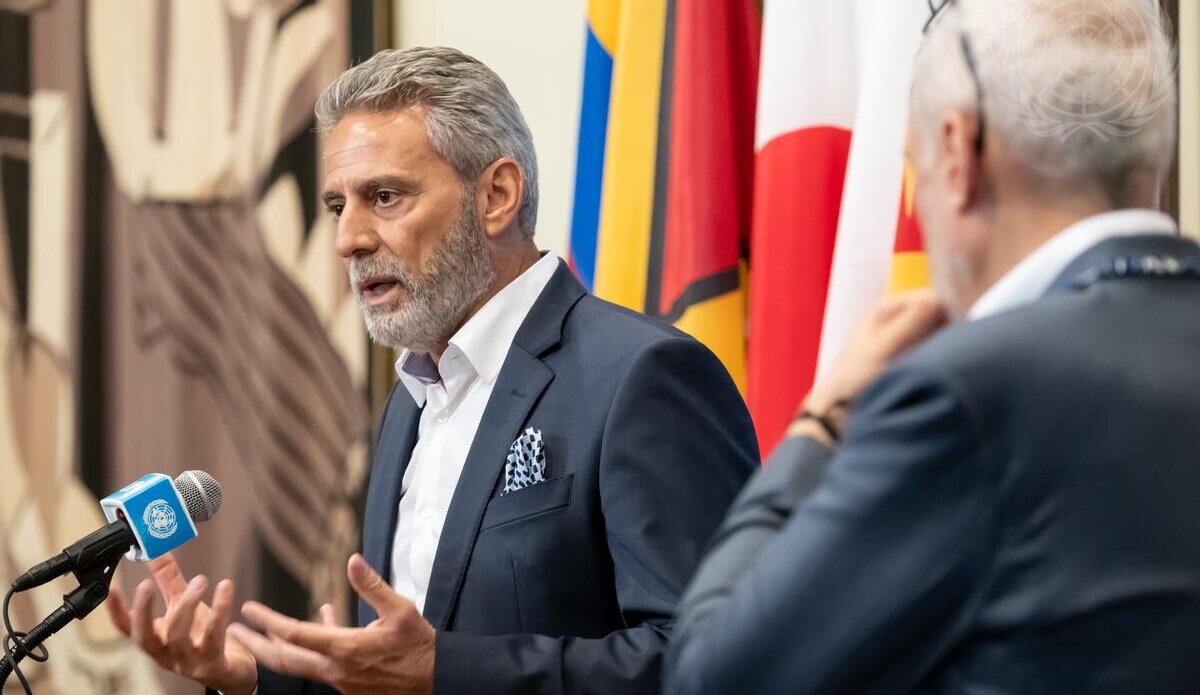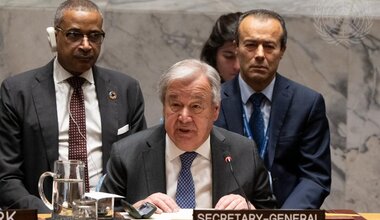Security Council Briefing on the Situation in the Middle East (As delivered by Deputy Special Coordinator Muhannad Hadi)
Madam President,
Members of the Security Council,
At the outset I would like to convey the apologies of Special Coordinator Wennesland, who asked me to deliver these remarks on his behalf, due to unforeseen circumstances.
Last week Special Coordinator Wennesland briefed the Security Council on the dynamics unfolding in Gaza, the occupied West Bank and the broader region.
Regrettably, the situation remains grave across the region.
Israeli military operations continued across the Blue Line with Lebanon, as did the firing of rockets by Hizbullah toward Israel, including a barrage this weekend.
I welcome the ongoing diplomatic efforts to reach a cessation of hostilities and urge the parties to accept a ceasefire anchored in the full implementation of Security Council Resolution 1701.
The Special Coordinator also outlined a number of key principles that would lay the groundwork for a viable and sustainable political future for Israelis and Palestinians, within a more peaceful and stable region.
Since the conflict began, the United Nations has consistently urged the international community and the parties to chart a course towards peace.
We continue to call for an immediate ceasefire, the immediate and unconditional release of all hostages and the de-escalation of tensions around the region.
We continue to demand immediate steps to improve the delivery of humanitarian assistance, which is failing to meet even the most basic needs of Gaza’s population.
We continue to call for political and security frameworks that would move us closer to resolving the Israeli-Palestinian conflict, ending the occupation, and achieving a two-State solution.
Madam President,
As winter approaches, the horror in Gaza continues to grind on with no end in sight.
In the more than thirteen months of conflict since the vicious attacks by Hamas and other Palestinian armed groups inside Israel on 7 October 2023, some 44,000 Palestinians and some 1,700 Israelis and foreign nationals have been killed.
Over 100,000 Palestinians, many women and children, and tens of thousands of Israelis, including women and children, have been injured.
101 Israelis are still held in Gaza, being held in horrific conditions and denied humanitarian visits.
Recent weeks have seen the devastating intensification of IDF operations in North Gaza, with mass casualty incidents occurring with alarming frequency.
On 10 November, 36 Palestinians, including women and children, were reportedly killed while others were injured, when a multi-story building was hit in Jabalya Al Balad.
On 16 November in Beit Lahiya, two separate Israeli airstrikes reportedly killed at least 65 Palestinians, including women and children, when buildings hosting IDPs were hit.
These are but a small fraction of the deadly incidents that have occurred in recent weeks.
The IDF has said it is targeting Hamas personnel and locations and takes steps to mitigate harm to civilians.
On top of the daily carnage, we continue to witness displacement and destruction, including of civilian infrastructure.
Repeated evacuation orders issued by the IDF have triggered over 100,000 people to be displaced from Northern Gaza southward, since IDF ground operations resumed in the area on 6 October.
The resulting influx into Gaza City and surroundings has increased the population to some 375,000 people, with only an estimated 75,000 remaining in Northern Gaza.
Access to humanitarian aid remains a daily struggle and involves huge personal risk.
Looting of humanitarian supplies by Palestinians is intensifying and becoming more organized and more violent.
In one incident, on 16 November, a UN convoy comprising 109 trucks of food supplies was violently looted by Palestinians, with 97 trucks lost.
On 18 November, over 20 people were reportedly killed by armed Palestinians in an operation said to be led by the Gaza Ministry of Interior to target looters of humanitarian aid.
I again unequivocally condemn the widespread killing and injury of civilians in Gaza and the endless displacement of the population.
I also condemn the continued holding of hostages in Gaza, and the indiscriminate firing of rockets toward Israeli population centres by Hamas and other Palestinian armed groups, which has continued this month.
Attacks on humanitarians and humanitarian convoys must cease immediately.
Law and order must be restored, and the civilian population must have safe access to vital aid.
Madam President,
The level of essential goods, including humanitarian assistance, that has been allowed into Gaza is inadequate to meet the overwhelming needs of the population.
The campaign in Gaza to vaccinate against poliovirus concluded having reached over half a million children.
It demonstrates what is possible when basic humanitarian operational requirements are met.
As I warned, in my capacity of Humanitarian Coordinator, the delivery of critical aid across Gaza is grinding to a halt and that the survival of two million people hangs in the balance.
I urge Israel to fulfil its obligations to facilitate the rapid and unimpeded passage of humanitarian relief into and throughout Gaza and for all parties to respect safe delivery of assistance.
Madam President,
As we confront the enormous challenges in Gaza, we are also witnessing the increasingly dangerous dynamics unfolding in the occupied West Bank, including East Jerusalem.
Violence has continued at alarming levels.
During the reporting period, 32 Palestinians were killed mostly in the context of ISF operations and clashes with armed Palestinians, including in Area A. The IDF say they are targeting Palestinian militants.
While shooting and ramming attacks by Palestinians continued, no fatalities were reported in the occupied West Bank or Israel.
Israeli settlers and other civilians also continued to attack Palestinian communities in the West Bank, many in the context of the olive harvest, while Palestinian attacks on Israelis also continued.
The Israeli Government has also continued its unrelenting advancement of settlements and its policy of evictions and demolitions of Palestinian-owned structures.
On 28 October, Israeli planning authorities advanced approximately 120 housing units in settlements in area C in the occupied West Bank.
And on 5 November, Israeli forces demolished nine homes in East Jerusalem.
While these dangerous steps accelerate, some ministers are now openly calling for the annexation of the West Bank.
I reiterate that annexation constitutes a violation of international law and must be firmly rejected.
It is crucial that the Palestinian Authority is supported politically and financially.
The waiver that allows Israel’s banking system to cooperate with Palestinian banks is set to expire at the end of the month, once again threatening the Palestinian banking sector and economy.
The use of this renewal letter as a perpetual threat of economic instability, alongside other unilateral steps that undermine the PA’s fiscal stability must end.
Madam President,
Allow me to share a few final reflections from the Special Coordinator.
Developments across the occupied Palestinian Territory, both Gaza and the West Bank, including East Jerusalem, suggest we are at imminent risk of losing the frameworks we have been operating under since 1967 and 1973 when the Security Council adopted the resolutions aimed at laying the foundations for a just and lasting peace.
We must never allow for a repeat of the 7 October Hamas attacks and their aftermath; we must treat Gaza and the West Bank as a whole, integral to the vision of an independent Palestinian State and avoid repeating the political and administrative divides of the past; we must preserve and strengthen the Palestinian Authority and its institutions; we must create the space for a political solution, not a violent one.
If the forces seeking to undermine the two-State solution are successful, the collapse of the relevant principles and institutional structures will have a ripple effect that could spread far beyond the Middle East.
The United Nations and this office – UNSCO – in particular has a critical role to play in protecting and promoting the very frameworks the international community – and the parties themselves – have identified as the basis for a more peaceful and secure future.
But this requires renewed support from the international community, particularly from the region, to create the enabling conditions for diplomacy to be effective.
We need a ceasefire; we need to get the hostages out, we need life-saving support to be delivered safely now, and we need to ensure the long-term safety and security of Palestinians and Israelis.
Thank you.
 UN
UN




![Sigrid Kaag, United Nations Special Coordinator for the Middle East Peace Process Ad Interim, briefs the Security Council meeting on the situation in the Middle East, including the Palestinian question. [UN Photo/Manuel Elías - 28 May 2025]](https://unsco.unmissions.org/sites/default/files/styles/380x220/public/field/image/un71101108_250528-me_ted_101102-48874_.jpg?itok=3ZE5kRpP)
